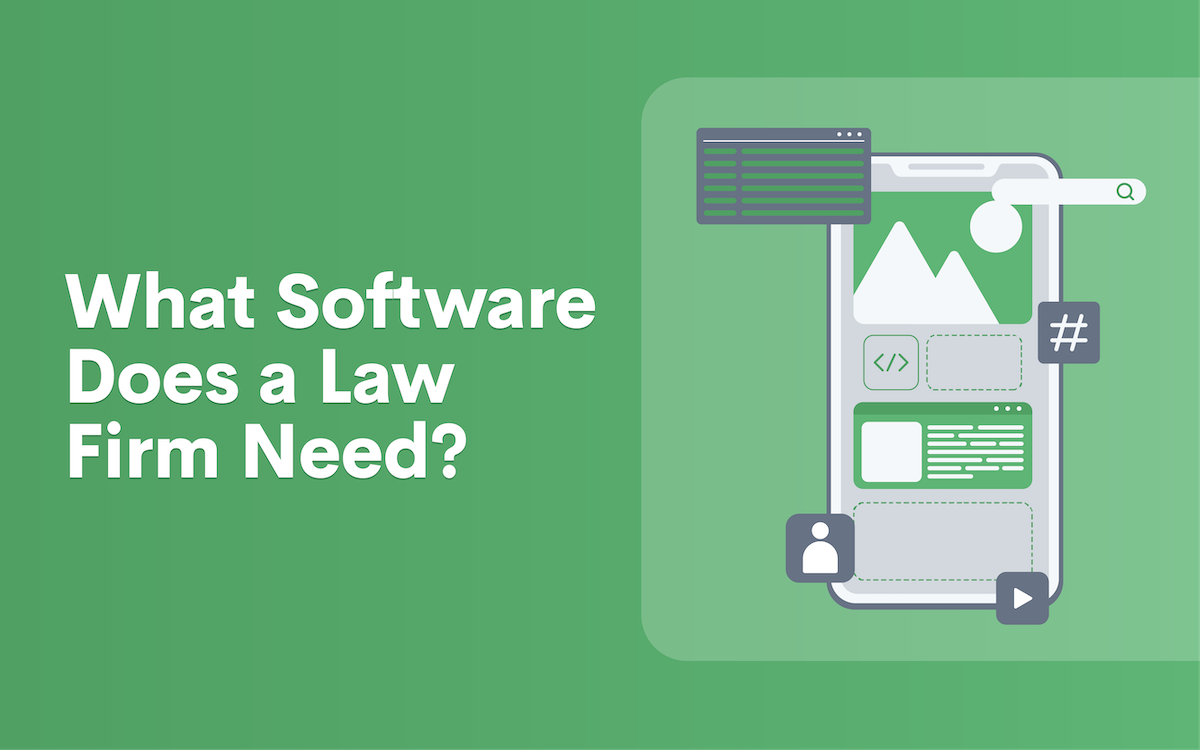What Software Does a Law Firm Need?

Technology has transformed virtually every segment of society. No matter their age or where they live, people everywhere use technology to make their daily lives easier.
Technology is also becoming increasingly vital in the legal industry. However, according to one recent survey, only 36.7 percent of the lawyers surveyed are satisfied with the technology tools used at their firms. In addition, only 37.1 percent said they had used a new product at their firm in the last month. This data indicates that lawyers generally aren’t pleased with the technology they have, and their firms are not introducing many new tools either.
So what software does a law firm really need?
How does software help lawyers?
Technology makes attorneys’ jobs simpler by increasing the availability and value of legal services while decreasing costs. Here are some of the ways technology helps lawyers:
- Improved communications. Technology, such as CRM for law firms, helps lawyers diversify the ways they communicate with clients and colleagues. Communication solutions allow lawyers to communicate via phone, instant messaging, email, web conferencing, and secure client portals whenever and wherever necessary.
- Time savings. According to the 2022 Legal Trends Report, the average U.S. attorney performs only two-and-a-half hours of billable work daily. Technology allows lawyers to automate routine, time-consuming administrative work that takes them away from substantive legal work that requires their skill and expertise.
- Streamlined case management. Digital case management makes it easier for attorneys to share documents with colleagues in the firm when necessary, and web-based case management platforms make them accessible to lawyers working remotely on mobile devices. In addition, case management software allows firms to automate client intake, prioritize client service, and organize documents in one centralized location.
- Leverage analytics. Legal technology enables lawyers to track key analytics and data in a way that’s easy to manage and understand. Solutions allow attorneys to see how close they are to reaching growth objectives and where they need to make changes to create actionable strategies.
- Build online communities. Online communities help those who are disadvantaged and underserved gain access to legal services. These communities allow lawyers and law students to share information and debate issues. Social media platforms like LinkedIn are also becoming an important forum for lawyers to network and collaborate.
New software and platforms are transforming the law profession, and many firms are embracing digital transformation. But first, they must partner with the right provider to gain access to the necessary tools.
What are the different types of law practice management software?
Today’s lawyers, including those setting up a solo practice, implement various technologies, such as document and filing services, secure communication portals, research platforms, and cloud-based organizational software. Here are some common types of law firm technology used by lawyers.
Six types of legal management software
- Online file storage. Whether attorneys are working remotely or looking for streamlined access to documents anytime and anywhere, cloud-based online file storage tools are critical for lawyers. These platforms protect files from internal and external threats with end-to-end, zero-knowledge encryption.
- Document management. While paperwork is an inescapable part of practicing law, document automation tools streamline document creation by utilizing information previously collected to populate standard letters and forms and provide safe storage and access to those documents. Systems like Clio Manage offer simple, all-in-one solutions for document generation, organization, and storage.
- eDiscovery tools. Most discovery is now electronic, which requires technology to streamline the eDiscovery process. Cloud-based eDiscovery software automates thousands of formerly manual steps and processes and offers innovative filtering options to save teams time and effort.
- Practice management. Predominantly cloud-based, practice management platforms allow lawyers and paralegals to organize and manage court dates, automate cases, calendar events, templates, case files, and more. Firms of all sizes can utilize cloud software for law firms such as these to organize substantial amounts of data into an easily accessible virtual filing cabinet.
- Cloud-based office suites. Cloud-based platforms like Microsoft 365 and Google Suite (G Suite) allow attorneys to access, share, and edit documents, files, and other data from anywhere in the world with an internet connection. Documents are stored on a remote cloud service that can be accessed using a web browser.
- Legal CRM. Legal client relationship management (CRM) software tracks everyone a firm interacts with – clients, vendors, outside counsel, witnesses, and more – to provide an overview of matters, documents, communications, transactions, and billings – through one secure client portal.
Lawmatics CRM: software your law firm needs
Lawmatics CRM for lawyers helps drive efficiency, attract more prospects, increase client engagement, and accelerate your firm’s growth. For more information on how our platform manages the entire legal client journey – step by step – request your free demo today.


